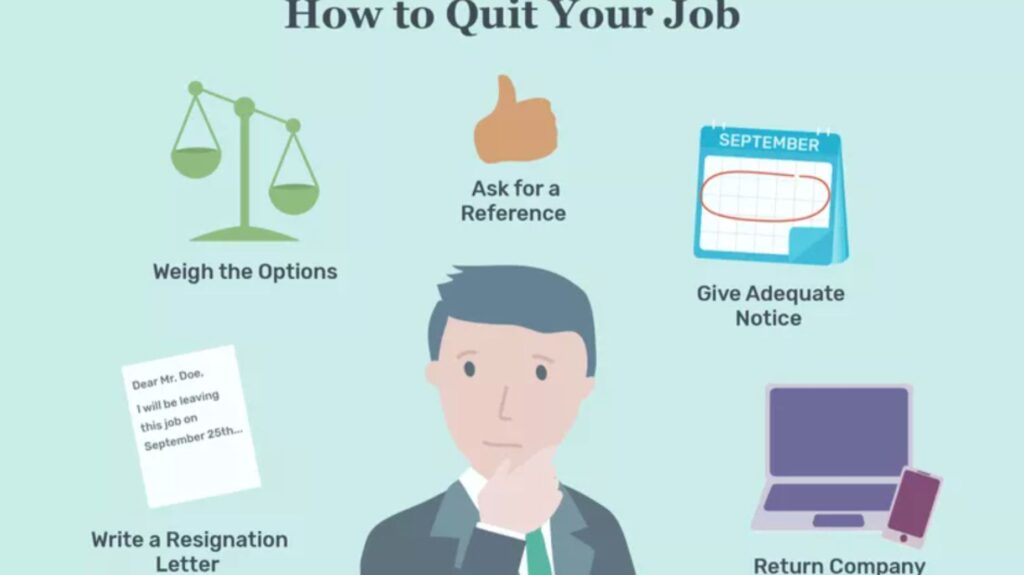Leaving a job is a big decision — and how you exit can shape your career long after you’re gone.
A messy departure might feel satisfying in the moment, but it can haunt you later with bad references, lost connections, or even a damaged reputation.
Here’s how to quit a job professionally, respectfully, and strategically — without being that person everyone gossips about at the office.
1. Make Sure You’re Really Ready to Leave
Quitting a job isn’t just about saying “I’m out!” — it’s a major career move that deserves careful thought. Before you start drafting your resignation letter, slow down and do a quick gut check:
-
Review Your Reasons:
Ask yourself why you’re leaving. Is it because of a toxic work culture, low pay, lack of growth, or burnout? Knowing your “why” helps you avoid jumping into a new job with the same issues.-
If it’s pay: Did you try negotiating?
-
If it’s your boss: Could you transfer to another department?
-
If it’s burnout: Would a vacation or a role shift solve it?
-
-
Secure Your Next Step:
The best time to job hunt is while you’re still employed — you’ll have leverage, income, and peace of mind. If you don’t have another job lined up, make sure you’ve got savings to cover living expenses (3–6 months is ideal). -
Think Long-Term:
Imagine yourself 6 months from now — does quitting move you closer to your career goals, or is it just an emotional reaction? Sometimes staying put for a little longer can position you for a promotion, bonus, or better exit timing.
2. Give Proper Notice (Usually Two Weeks)
Two weeks’ notice is the professional gold standard, and it’s more than just a courtesy — it’s your chance to leave with grace.
-
Follow Your Contract:
Some industries (finance, healthcare, executive roles) may require more notice — check your employment agreement before committing to a date. -
Plan Your Timing:
Try to avoid quitting during peak deadlines, major company events, or when your boss is on vacation. A well-timed resignation makes life easier for everyone and shows maturity. -
Be Prepared for Early Exit:
Some companies may ask you to leave immediately (especially if you work in competitive or confidential roles). Mentally and financially prepare for that possibility.
3. Write a Short, Professional Resignation Letter
Your resignation letter doesn’t need to be a dramatic tell-all — keep it clean and professional.
-
Be Direct: Clearly state your intention to resign and your last working day.
-
Be Grateful: Even if the job was tough, thank them for the opportunity and experience.
-
Be Helpful: Offer to help transition your workload so nothing falls through the cracks.
Sample Template:
Subject: Resignation – [Your Name]
Dear [Manager’s Name],
Please accept this as my formal resignation from [Company Name], effective [last working day, typically two weeks from today].
I’m grateful for the opportunities and support during my time here and will do everything I can to ensure a smooth transition. Please let me know how I can help during this period.
Best regards,
[Your Name]
Keep it short — your resignation letter is a formality, not a therapy session.
4. Tell Your Manager First
No one wants their boss to find out through the office rumor mill or a Slack thread.
-
Schedule a Private Conversation: Ideally, do it face-to-face. If remote, use a video call — quitting by email or text is impersonal and unprofessional.
-
Be Calm and Clear: Thank them for the opportunity, then explain that you’ve decided to move on. You don’t have to overshare about your next personal project.
-
Be Calm and Clear: Thank them for the opportunity, then explain that you’ve decided to move on. You don’t have to overshare about your next job — keep it professional and positive.
-
Expect Mixed Reactions: Your boss might be supportive, surprised, or even upset. Stay calm, avoid getting defensive, and don’t burn bridges — you never know when you’ll need a reference or run into them later in your career.
5. Wrap Up Your Work Like a Pro
Your last two weeks are your professional encore — make them count.
-
Document Everything: Create a handoff document with status updates, deadlines, and important contacts for whoever takes over.
-
Finish What You Can: Complete open projects if possible or leave clear next steps for the team.
-
Train Your Replacement: If a new hire is brought in quickly, spend time onboarding them. This leaves a great impression.
6. Keep Your Network Warm
Just because you’re leaving doesn’t mean you should disappear.
-
Connect on LinkedIn: Add coworkers, managers, and clients before your last day.
-
Send a Goodbye Note: A short, professional farewell email can thank your team and leave the door open for future collaboration.
-
Stay in Touch: Check in occasionally after you leave — networking is easier when you keep relationships alive.
7. Don’t Vent on Social Media
It might feel tempting to post a “good riddance” rant on LinkedIn or Twitter, but it’s not worth the risk. Recruiters and future employers will see it, and it could make you look unprofessional.
Instead, share something positive:
“I’m excited to share that I’m moving on to a new chapter in my career. Thank you to everyone at [Company] for the experience and support!”
8. Exit Interview: Be Honest, Not Brutal
If your company does exit interviews, give constructive feedback, not a scorched-earth speech.
-
Be Professional: Focus on what could be improved, not on blaming individuals.
-
Offer Solutions: If you mention problems, suggest ways to fix them.
-
Stay Neutral: Avoid gossip or overly personal complaints — keep it factual and calm.
9. Leave on a High Note
Your reputation follows you. A graceful exit can lead to:
-
Strong References: Your manager will remember how you handled your departure.
-
Future Opportunities: Some employees return to old companies (called “boomerang employees”) and get rehired at higher pay.
-
Peace of Mind: You’ll walk away knowing you handled things like a professional.
Why a Professional Exit Matters
A “mic drop” exit might feel satisfying, but word travels fast in most industries. Staying respectful protects your reputation, keeps doors open, and can even lead to future job offers or collaborations.


